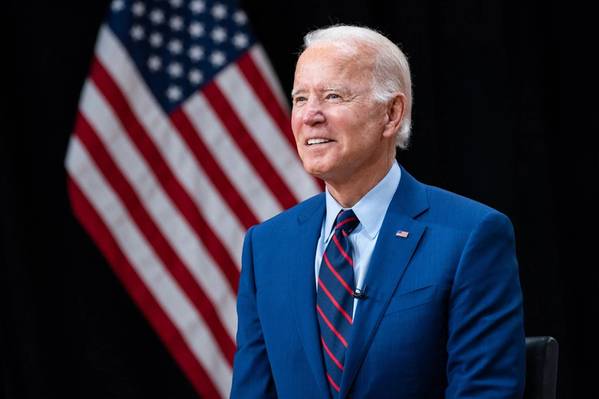
President Joe Biden on Wednesday signed a new raft of executive actions to combat climate change, including pausing new oil and gas leases on federal land and cutting fossil fuel subsidies, as he pursues green policies he billed as a boon for job creation.
The orders map out the direction for the Democratic president's climate change and environmental agenda and reverse the policies of his Republican predecessor, Donald Trump, who sought to maximize U.S. oil, gas, and coal output by removing regulations and easing environmental reviews.
"In my view, we've already waited too long to deal with this climate crisis," Biden told a White House ceremony, noting the threats the nation faces from intensifying storms, wildfires, floods, and droughts linked to climate change as well as air pollution from burning fossil fuels. "It's time to act."
Biden unveiled a "whole-of-government approach" to put climate change concerns at the center of U.S. national security and foreign policy as well as domestic planning. He said building a modern and resilient climate-related infrastructure and a clean energy future for America would create millions of good-paying union jobs.
"This is a case where conscience and convenience cross paths, where dealing with this existential threat to the planet and increasing our economic growth and prosperity are one and the same. When I think of climate change and the answers to it, I think of jobs," added Biden, who faces pressure from liberals in his own party for aggressive action on climate change.
Biden's measures to address climate change have cheered international partners and environmental advocates, but have drawn opposition from Big Oil, which argues his moves would cost the United States millions of jobs and billions of dollars in revenue with the U.S. economy still battered by the COVID-19 pandemic.
“With a stroke of a pen, the administration is shifting America’s bright energy future into reverse and setting us on a path toward greater reliance on foreign energy produced with lower environmental standards,” said Mike Sommers, president of the American Petroleum Institute, the nation's biggest oil industry association.
Oil, gas leases
U.S. special climate envoy John Kerry said the United States plans to announce a target for reducing its greenhouse gas emissions by 2030 under the Paris climate accord before an international climate summit that Biden will host on April 22.
Biden last week announced plans to rejoin that accord after Trump abandoned it, part of a previous series of climate actions that included blocking TC Energy Corp's Keystone XL oil pipeline project from Canada.
China leads the world and the United States is second in greenhouse gas emissions, which scientists link to climate change. Kerry indicated the United States would work with China but would not trade other pressing concerns to make climate progress.
Biden directed the Interior Department to pause new federal oil and gas leases on public lands and offshore waters "to the extent possible" and undertake a "rigorous review" of existing leasing and permitting practices. The pause will not restrict energy activities on lands that the government holds in trust for Native American tribes.
Biden also set a goal to conserve 30% of federal land and waters to protect wildlife by 2030 and seek to double renewable energy production from offshore wind, also by 2030.
The orders affect large swaths of land onshore in mostly Western states, as well as offshore drilling acreage located mainly in the U.S. Gulf of Mexico, which combined, make up about a quarter of the U.S. oil and gas supply.
The Western Energy Alliance, which represents drilling companies that operate in Western U.S. states, sued to block the federal drilling freeze hours after the order was signed.
Michelle Lujan Grisham, the Democratic governor of New Mexico, which relies heavily on revenue from federal lands drilling, said her office would work with the Biden administration for a policy that “takes into account the individual circumstances and near-term financial reality of states like ours.”
Lujan Grisham told Reuters in 2019 that she would seek an exemption from the White House if a federal drilling ban were ever imposed, but has not commented on the idea since.
Fossil fuel subsidies
Biden also directed federal agencies to "eliminate fossil fuel subsidies as consistent with applicable law." It was not clear which subsidies could be stripped away under the order, given many of the industry's tax breaks are congressionally approved. Biden also said he would ask Congress to end the $40 billion in fossil fuel subsidies through legislation.
The president said his goal was to achieve an electric energy sector fully without carbon pollution by 2035. He cited "environmental justice" in his plan to spur investment in low-income and minority communities disproportionately affected by pollution. He also vowed to help revitalize the economies of coal, oil and gas and power-plant communities.
Environmentalists welcomed Biden's moves. Fred Krupp, president of the Environmental Defense Fund, said the president's action "makes clear he is serious about restoring and strengthening American leadership on climate solutions."
(Reporting by Valerie Volcovici and Jeff Mason; Additional reporting by Timothy Gardner, Makini Brice, Lisa Lambert, Gary McWilliams and Jessica Resnick-Ault; Writing by Will Dunham; Editing by Richard Valdmanis, Lisa Shumaker and Peter Cooney)